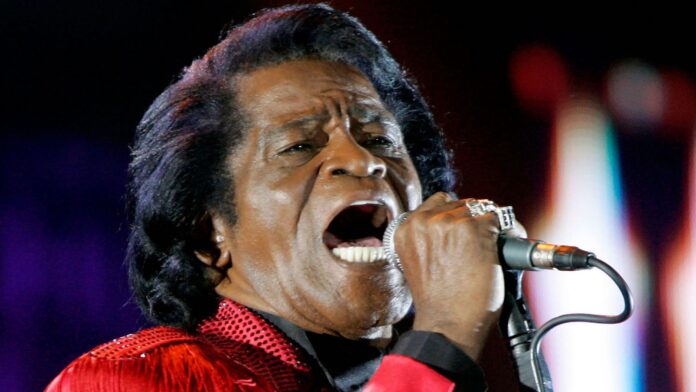
(CNN) — James Brown died in 2006, but he has yet to rest in peace. His children and advisors spent years fighting over his colossal fortune. A daughter claimed his crypt was empty. A court ruled that his fourth wife was not really his wife.
And more than a dozen people who knew the Godfather of Soul have called for an autopsy or criminal investigation of his death.
The story keeps getting stranger. In recent weeks, the Fulton County District Attorney’s Office in Atlanta said it found potential evidence related to Brown that had somehow been missing for more than a year.
And a lawyer for the woman who turned in the evidence says he’s asked the FBI to look into the matter.
The controversy with the DA’s office began in 2020, when a former associate of Brown named Jacque Hollander submitted a green plastic bin full of potential evidence — including a black stiletto shoe and a handwritten note — and said it could help prove that Brown had been murdered.
Paul Howard, then the district attorney, said his investigators would speak with half a dozen potential witnesses named by Hollander and decide what to do from there. But in internal case documents obtained by CNN via the Georgia Open Records Act, there is no indication those interviews ever happened.
Howard lost an election later that year to challenger Fani Willis, who closed the Brown inquiry in 2021 without taking action. When Hollander asked the DA’s office to return the green plastic bin and the items therein, she got a mysterious response.
“We have shipped the items requested,” assistant chief of evidence William Chris Clark wrote to her.
But instead of the green plastic bin, officials sent her a cardboard box that contained mostly old newspaper clippings — as well as two old mobile phones that she did not remember seeing before. Despite repeated inquiries from both Hollander and CNN, no one would explain what had happened to the green bin and the potential evidence.
Early this year, Hollander sued the DA’s office, seeking answers about the missing items. When the DA failed to respond to the lawsuit, Hollander filed a motion for default judgment. In May, attorneys finally responded to that motion, blaming “excusable neglect.”
The motion and the lawsuit are still pending — Hollander’s attorney says the DA’s office has yet to turn over all the documents he’s seeking under the Georgia Open Records Act — but in September, the DA’s office finally shipped the green plastic bin and the items in evidence bags back to Hollander’s attorney.
No one explained where the items had been for the previous 18 months, or how they were found. A spokesman for the DA has not returned numerous inquiries for multiple stories regarding James Brown dating back more than two years.
A CNN reporter listened via speakerphone on the day Hollander and her attorney, Michael Iasparro, opened the green plastic bin and catalogued the items. They said documentation in the bin made it appear the bin had remained sealed since February 12, 2020, the day Hollander turned it over.
“You can tell that no one ever, ever even looked at this evidence,” Hollander said.
While the DA’s office has not publicly explained why the inquiry was closed without action, Assistant DA Michael Sprinkel wrote in an internal email in 2021 that after he’d spoken with Jacque Hollander for “probably 10+ hours,” he didn’t have “reasonable suspicion that a crime occurred.”
Some people think Brown was murdered. But the full truth surrounding his death remains unknown
Iasparro, Hollander’s attorney, worked closely with the FBI during his six years as a federal prosecutor. After the green plastic bin turned up again, he requested an appointment with the FBI regarding Brown’s death and the conduct of the DA’s office.
Iasparro said he met with a supervisory FBI agent October 10 at the Rockford, Illinois, office of Hinshaw & Culbertson, where he is a partner. He said he told the agent what happened and handed over a stack of documents related to Hollander’s lawsuit against the district attorney.
“That referral’s been made,” Iasparro said. “We’ll see what they do with it.”
A CNN reporter asked the FBI about the meeting and what would happen next.
“Unfortunately,” Chicago-based Special Agent and Public Affairs Officer Siobhan Johnson replied in an email, “Department of Justice policy prevents the FBI from commenting on the existence, non-existence, or nature of any investigation that may be occurring.”
Those who have asked for more answers regarding Brown’s death include his son Daryl and Brown’s manager, Frank Copsidas, who told CNN in a 2022 interview that Brown “was murdered” and that “somebody wanted him dead.”
But law enforcement authorities have yet to conduct a full investigation, and the DA’s office has never publicly explained why it ended its limited inquiry in 2021 without seeking an autopsy.
Sandy Monroe, a county attorney representing the DA’s office in the lawsuit, spoke to CNN briefly by phone in early October.
“I can’t discuss the case with you,” she said.
She was asked how the potential evidence had been lost and how it was eventually found.
“I am not at liberty to tell you that,” she said.
All these years after Brown’s death, the full truth remains unknown.
In a 2017 interview with CNN, Marvin Crawford, the doctor who signed Brown’s death certificate, said he wanted an autopsy to find out how Brown really died. That autopsy has not been done.
In a 2018 interview, Brown’s daughter Deanna declined to confirm or deny whether Brown’s body was in the crypt.
In 2020, Brown’s friend Andre White died, taking his secrets to his grave — including the whereabouts of what he claimed was a vial of blood that might have shed light on what killed Brown.
Almost seven years after she first called CNN to report her suspicions, Jacque Hollander’s conclusions remain the same:
“What happened to James Brown is, he was murdered for money.”


